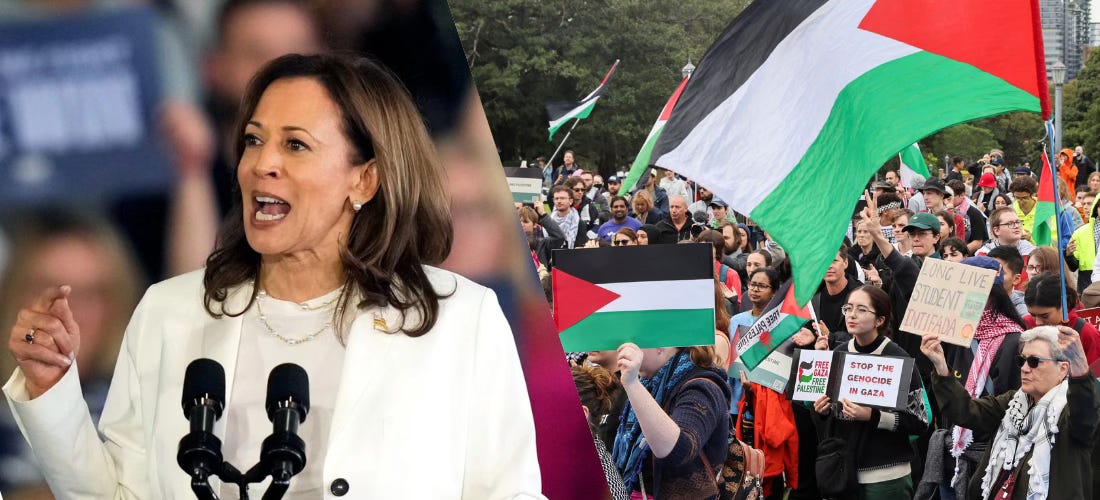A few days ago, Kamala Harris was confronted by pro-Palestinian protesters during a rally in Michigan. As they chanted, “Kamala, Kamala, you can’t hide! We won’t vote for genocide,” she initially responded by acknowledging their right to protest, saying, “I’m here because we believe in democracy. Everyone’s voice matters.” However, she then shifted to a more forceful tone, declaring, “If you want Donald Trump to win, then say that. Otherwise, I’m speaking,” before the protesters were eventually escorted out.
Views on this moment have varied, but many have lauded Kamala Harris for displaying “girl boss energy” during the exchange. There’s also a wide sentiment that the protesters were handled accordingly for daring to interrupt her. Personally, I don’t agree—every moment is the right moment to protest against genocide.
I myself have had events that were interrupted or altered by protests for Palestine, and was glad to see it. There is nothing more heinous, no human act worse, than genocide being committed. Which is why Harris’s rally moment has been on my mind ever since.
Up until that point, Harris had been running what felt like a tight campaign—every move calculated, every word measured. She masterfully leveraged the excitement around her intersection of identities, chose a surprisingly good running mate in Tim Walz, and captured the idea that she will “bring back joy”. But when those voices interrupted her rally, her response did more than just reveal a strategic misstep; it exposed a deeper issue with Harris and some supporters.
First, to suggest that those who are protesting for Palestinian lives are somehow aligning with Trump is not just disingenuous—it is a profound error in understanding the complexity of human pain and the importance of holding space for multiple truths. Pain, especially the kind born from witnessing violence and injustice, does not fit neatly into the binary choices that our politics or respectability often demands.
Second, in this moment of profound agony, it is a failure to not acknowledge that you can support Kamala Harris and still bear witness to the deep suffering of our brothers and sisters. The cries from Gaza echo with the pain of lives lost, futures obliterated, a destruction financed by our own government's hand.
To dismiss this pain with a wave of political loyalty is not only inappropriate but a grave injustice, devoid of the empathy that our shared humanity demands.
People protesting to free Palestine do not wish for another Trump presidency; they yearn for an end to the genocide, a cessation of the senseless bloodshed that should tear at the very fabric of all of our souls.
What Harris missed in that moment was the opportunity to demonstrate true leadership—a leadership that not only allows for dissent but understands it as a crucial part of the democratic process. By deflecting the protesters’ pain instead of addressing it, she overlooked the necessity of seeing people in their fullness, especially when their truths challenge the comfortable narratives of the status quo.
One would hope that as a Black South Asian woman who is running for president, and the currently occupies the role of Vice President, she would understand better than most the need to disrupt harmful status quo.
Democrats would also be wise to remember that those protestors are part of an important voter bloc in a swing state, and the tone Kamala Harris employed when confronted, which could be seen as condescending or dismissive, is not without precedent. The outcomes of such moments have often been damning—which we saw with Hillary Clinton’s 2016 campaign.
But this isn’t merely about campaign optics; it’s about what kind of future we want to build. Are we striving for a world where freedom is not just a slogan, but a reality that embraces all voices, even the uncomfortable ones? Harris’s response fell short of that vision.
The truth we often overlook is that pain, in its many forms, touches each of us. We are all engaged in our own battles, striving toward something, grappling with what wounds us. But we must understand that agony, grief, and fear do not weigh equally on every heart; they lie along a spectrum, different for each of us. There are moments when the burden falls on us to stretch beyond our own suffering, to carve out room for the anguish of others. It is in this difficult labor that we find the true measure of our humanity.
We need to remember how to hold space, to cradle the tender ache of another’s experience, to sit in the silence that follows the cry of the world without rushing to fill it with our own certainties. Too often, in our haste to advance, we forget that progress is not just the swift march forward but also the careful tending to those who stumble along the way. There is a rhythm to this work—a rhythm that requires us to pause, to listen, to breathe in the breath of the other, and to recognize that their pain is also ours, that their journey informs our own.
Everyone is moving with such velocity, propelled by the urgency of defeating Donald Trump and JD Vance. But in our rush, we risk losing sight of the very essence of what it means to be human. We risk forsaking empathy for efficiency, strategy for compassion. Harris’s campaign, like all of us, must learn to inhabit this space of tension where the future we long for and the present we endure coexist.
To hold space is to recognize that our strategies, however sharp and calculated, are only as strong as the empathy that underpins them. It is to understand that without empathy, our strategies become brittle, unable to withstand the weight of the human experience they are meant to carry. The protesters’ voices were not mere interruptions; they were reminders of the flesh-and-blood reality behind the policies, the lives hanging in the balance of every decision made on the grand stage of politics.
So, we must ask ourselves: How do we move forward without leaving behind the very people we claim to fight for? How do we lead with both head and heart, strategy and soul? The answer lies in our willingness to slow down, to create spaces where grief and hope can coexist, where the aspirations of the many do not trample the sorrows of the few.
This is the work of tomorrow, the work of building a world where holding space for another is not seen as a concession but as a strength. Where leadership is measured not just by the victories won but by the humanity preserved in the process.
If you haven't yet, make sure to grab a copy of my poetry collection We Alive, Beloved—your support means everything. Purchasing books and becoming a paid subscriber are crucial for sustaining my work.







Interestingly enough, her actions made her more relatable to me. As a black woman, EVERYTHING we do is under a microscope, and the scrutiny that we experience is heartbreaking. I agree, that it is always the right time to protest against what is happening in Gaza, AND her reaction showed me that I will give you space, but I have boundaries. Could she have handled this incident differently- of course. I think Kdot said it best “sometimes you have to pop out and show a...” This is my two truths at one time. Like always, thanks for giving me something to reflect on and challenge myself.
My skin pricked a bit when I heard Kamala say those words, but I didn't know exactly how to express my unthought feelings. Yes, I agree that her response lacked compassion. On the other hand, I think women have been silenced so long that in our struggle to reclaim our voices, we are not (always) able to be gracious. Please afford her the time and space that most white male politicians seem to take for granted. They misstate and misstep all the time; yet are not judged quite as harshly as women. This is particularly true for my sisters of color, who are painted with unfair, mean tropes. I am grateful for your willingness to consider my point. And thank you for opening this discussion about the need for grace.